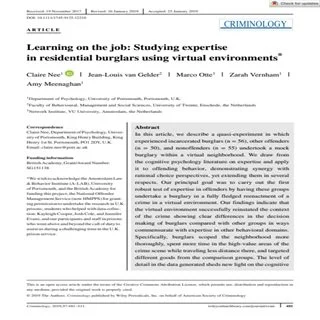By Claire Nee, Jean-Louis van Gelder, Marco Otte, Zarah Vernham, and Amy Meenaghan
In this article, we describe a quasi-experiment in which experienced incarcerated burglars (n = 56), other offenders (n = 50), and nonoffenders (n = 55) undertook a mock burglary within a virtual neighborhood. We draw from the cognitive psychology literature on expertise and apply it to offending behavior, demonstrating synergy with rational choice perspectives, yet extending them in several respects. Our principal goal was to carry out the first robust test of expertise in offenders by having these groups undertake a burglary in a fully fledged reenactment of a crime in a virtual environment. Our findings indicate that the virtual environment successfully reinstated the context of the crime showing clear differences in the decision making of burglars compared with other groups in ways commensurate with expertise in other behavioral domains. Specifically, burglars scoped the neighborhood more thoroughly, spent more time in the high-value areas of the crime scene while traveling less distance there, and targeted different goods from the comparison groups. The level of detail in the data generated sheds new light on the cognitive processes and actions of burglars and how they “learn on the job.” Implications for criminal decision-making perspectives and psychological theories of expertise are discussed.
Criminology Volume 57, Issue 3Aug 2019 Pages373-574


